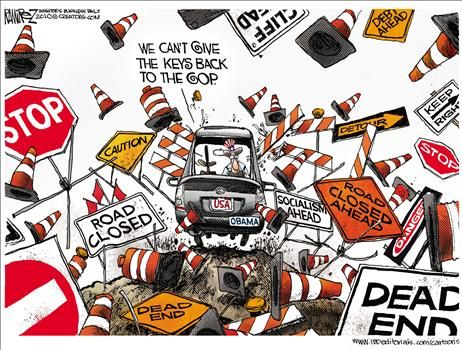SACHS: PANICKED OBAMA DROVE US DEEPER INTO THE DITCH/update
Barack Obama's favorite economic narrative goes like this: The Republicans drove us into the ditch and he has been able to pull us out only part of the way. Therefore, though times are bad, reelecting Republicans would mean undoing all his good work. Challenging this narrative is none other than very liberal Colombia University economics professor Jeffrey Sachs. Sachs argues that instead of beginning to pull us out of the ditch, the Obama administration, unlike the Merkel one, drove us deeper into the ditch. Why? Because they panicked and opted for short term solutions. Sachs know. He was there:
SACHS: We were on a binge, and the binge ended, as all binges do. And what I found surprising about the Obama approach was that it basically was trying to get people to start spending again where they were saying we're tired, we're tired, we need to save a little bit. And once one realizes that consumption is going to be down, we'd need a different approach from simply"stimulus," from cutting taxes for households to spend more. . . .So we needed the government to come in, in a different way. I don't think the markets was going to lead the recovery on its own. But what I did think is we need a long-term strategy, we need a long- term strategy based around investment rather than consumption. . . .
ZAKARIA: Now, the argument against that, I assume, is that you would have -- you would be allowing, you'd be countenancing a long decline. Or in the short term, that there would be jobs lost, there would be -- in other words, by not shoring up the system, you would be accepting high unemployment and slow growth.
SACHS: I think that's exactly right, that I believed that there was no magic solution. At the beginning I said the unemployment rate could get to 10 percent. Lo and behold, it did. And I did say, and we spoke about it on your show just before the administration came in, that you can't just blow up the deficit and do everything to try to make a binge and a bubble somehow come out perfectly. We should have taken a deep breath, given help to people that needed it temporarily, but understood that exactly what did happen was bound to happen, but not to break the budget and not to fail in thinking about the longer term.
What's happened is the stimulus substituted for thinking. The stimulus substituted for planning.
What I really worried about was -- and I said it to the White House then -- this may be the last thing you do in the macro economy. . . .
ZAKARIA: What did they say to you?
SACHS:
Well, they said we've got to act, we've got to act right now, it's desperate. I don't think it was so desperate. And I don't think it was solvable the way they decided to solve it.
ZAKARIA: So, going forward, you wouldn't do more stimulus? And you are worried about the deficit?
SACHS: I'm absolutely worried about the deficit because all over the world countries that have deficits like we do, 10 percent of GNP, are hitting the wall, facing massive crises. When is that going to happen with us? We don't know. But it could happen at any time because --
ZAKARIA: And if it does, that's the part -- the downside here is quite dramatic. If suddenly the world stops financing our deficit, you have to raise interest rates up very high.
SACHS: And it's not a theory because we see it. It's not a hypothetical.
In the U.K., in Spain, in Portugal, in Greece, in Ireland, they hit the wall. They had to take truly very harsh and tough measures in response to the loss of confidence. And I think we're, in any event, digging ourselves into a very, very deep hole.
Do we really want to owe trillions and trillions of dollars to China? Is that the best that America can do? I don't think so. Do we really want to play right on the edge of this massive indebtedness, which is what we're doing?
I was shocked, frankly, that when the administration came in and saw a trillion-dollar deficit, unprecedented, that they added to it and thought that that would work both politically and economically, rather than saying this is tough, we don't have a magic solution for the first year or two, but what we do need to do is have a solution for years three through 10 based on real investment and the real need for U.S. competitiveness. That's what has been missing.
I would add that Ben Bernanke and his fellow experts on whom Barack Obama relies so failed because they committed a basic logical fallacy. They assumed that if doing X results in Y, the opposite of X would result in the opposite of Y.
Ben Bernanke studied the depression and believed he succeeded in identifying the reasons for the Roosevelt administration's failure to pull the US out of that ditch. From that he deduced that to pull the American economy from the ditch all he has to do is do the opposite. The Roosevelt administration tightened, he will loosen. But, of course, as Aristotle has already pointed out this type of reasoning is fallacious. he was right not to repeat Roosevelt's mistakes. He was wrong to assume the solution is doing the opposite. Indeed, Bernanke spendthrift way, has not only failed to pull us out of the ditch. It has pulled us deeper into it in addition to squandering many of the tools needed to help pull us out.
What should be done?
NOTHING!
IT IS TIME FOR THE GOVERNMENT TO STEP ASIDE AND LET THE MARKET AND THE AMERICAN PEOPLE DO THEIR MAGIC.
Update: 61% of Americans agree that"the economy has gotten worse or stayed the same on Obama's watch."
